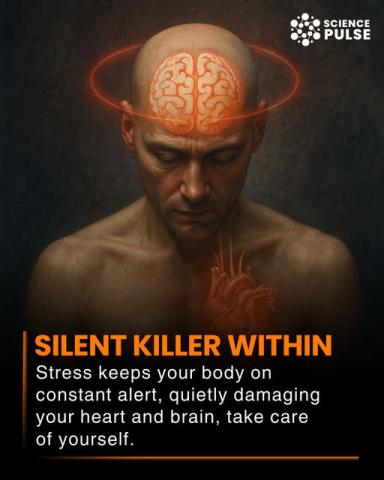We've all been there. It's match point. You have an easy overhead. You've made this shot a thousand times in practice, but now your arm feels like lead. Your heart is pounding in your ears. You swing, and... you shank it into the bottom of the net.
We call this "choking." We blame it on nerves. But what's actually happening inside your body is a primal, biological response that, if left unchecked, does more than just lose you a match—it can seriously harm your health.
Stress is more than just an emotional burden on the court. It's a physical saboteur.
The Science of the "Tight" Player
When you step onto the court under pressure, your body doesn't know the difference between a championship point and being chased by a saber-toothed tiger. It triggers a fight-or-flight response, flooding your system with cortisol and adrenaline.
This is great for a short burst of energy. But for a tennis match that can last hours? It’s a disaster. This heightened state was never meant to be permanent.
Here’s what that stress cocktail does to your game:
- Tense Muscles: Cortisol increases muscle tension. Your fluid, whip-like groundstroke becomes a stiff, robotic push. You lose racket head speed and feel.
- Racing Heart & Poor Breathing: Adrenaline quickens your heart rate and can lead to shallow breathing. This robs your muscles of oxygen, leading to early fatigue and a loss of fine motor control—precisely what you need for a delicate drop shot or a precise serve.
- Tunnel Vision: Stress hormones narrow your focus. Instead of seeing the whole court, your opponent's positioning, and the open angles, you only see the ball. You stop thinking strategically and start reacting panickedly.
In essence, chronic stress makes you a slower, weaker, less coordinated, and less intelligent version of the tennis player you truly are.
The Deeper Danger: Beyond the Scoreboard
The real danger of stress lies in its subtlety. While a missed shot is immediate and obvious, the internal damage builds slowly, often unnoticed until a more serious condition emerges.
When this state of high alert continues for weeks or months—from a demanding season, constant pressure to perform, or life stress bleeding onto the court—it begins to wear down your most vital organs.
- Your Heart: Chronic stress raises blood pressure and disrupts healthy blood flow, contributing to long-term risks for your cardiovascular health.
- Your Brain: Prolonged stress interferes with memory, focus, and emotional regulation. It clouds the very mental clarity you need to problem-solve during a match.
This is why managing stress isn't just about winning more games. It's about protecting your life. Protecting your heart. Protecting your brain. Managing stress is a non-negotiable part of an athlete's training regimen.
How to Break the Cycle: De-stress to Play Your Best
The good news is you can train your body to dial down this response. You can teach yourself to access a state of calm focus under pressure. Here’s how:
- Breathe Like You Mean It: Your breath is the remote control for your nervous system. Between points, practice box breathing: Inhale for 4 seconds, hold for 4, exhale for 4, hold for 4. This tells your body the "tiger" is gone and it's safe to relax.
- Develop a Pre-Point Routine: A consistent routine—bouncing the ball a set number of times, adjusting your strings, taking a deep breath—creates a anchor of familiarity in the sea of pressure. It focuses your mind on process, not outcome.
- Reframe Your Mission: The pressure often comes from the belief that "I HAVE to win." Shift your goal to "I WILL compete for every point" or "I WILL execute my game plan." This puts the focus on what you can control.
- Embrace Recovery: Stress isn't just mental. Physical recovery is crucial. Quality sleep, proper nutrition, and light movement on off-days (like walking or stretching) are essential for resetting your hormonal balance and healing your nervous system.
Your health depends on balance. On the court, learning to release tension isn't just a strategy—it's a powerful act of self-care that allows your true ability to shine through.
Please, take care of yourself. Your game depends on it.

